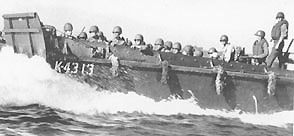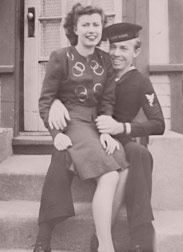 |
|||
|
Volume 12, Issue 23 ~ June 3-9, 2004
|
|||
|
|
Memorial Day Memories Sixty years ago, thousands of American troops began the liberation of Europe. This is the story of one of those men. Bill Gay’s D-Day
Gay was a red-haired man with cheeks still pale from the warm beard that had covered them just days before. After a long, cold winter on weather patrol in the stormy north Atlantic circling between Iceland, Greenland and Newfoundland to report the conditions for the convoys of supplies sent to support the war effort in Russia and England, the warm spring breezes of The Azores caressed his newly shaved cheeks. At 22, Hugh was a respected, experienced veteran to the younger crew. His primary duty was cook, but he was also a crack shot on the .50 caliber antiaircraft guns. There was an advantage to being on the good side of the ship’s cooks, so no one minded his jabs. “You’re next, Cookie. Let’s see if you can do any better,” a voice behind him rumbled. “Cooks don’t run small boats. We just feed you and take naps,” Hugh laughed as he glanced back, discovering too late it was the boat officer, a lieutenant commander, who had issued the challenge. On Your Mark Soon Hugh was climbing down the nets to the square, empty cockpit of the shoebox-shaped landing craft. He had trained on surf rescue boats during his basic training on Chincoteague Island and felt proud of his skills, but these floating boxes were something else. Visibility from the raised bridge in the stern was hampered by the steel armor. The flat bottom did not ride the waves smoothly. The single propeller and blunt, square bow did not respond quickly or efficiently to the wheel. Hugh caught on faster than some, but it took more than one try to master the idiosyncrasies of the boat and steer a straight course. The difficulty was to bring it smoothly alongside the larger frigate without bashing the steel hulls together. Then he had to hold it steady for 10 minutes. Next he took the landing craft to the beach, dropped the front ramp in four feet of water, then quickly raised it. The most complex maneuver was turning the lumbering little box around in a tight circumference in the surf. Landing craft were designed to ride high in the water with only a small skeg to aid the rudder in the turn. After several passes, Hugh’s skill impressed the lieutenant commander “You should have been a boatswain’s mate,” he said. For weeks Hugh and his shipmates practiced these moves, until the craft swam through the waves with the precision of a water ballet. They’d need that precision in the invasion. These awkward Higgins Boats would carry the fighting force that would free Europe from Hitler’s grasp. In early June, the frigate weighed anchor and headed north. Get Ready The exact destination was unknown, but the course seemed to lead into the English Channel along the north coast of France. Weather in the English Channel is often stormy as the cold winds from the North Sea are funneled through the narrow strait to meet the warmer waters of the Atlantic. In early June of 1944, stormy weather and rough seas discouraged General Dwight Eisenhower from launching the invasion on his preferred date, June 5, when tides were season’s lowest. He decided to try again the next day. The winds calmed during the night of June 5. Seas still broke high on the beach, but Eisenhower thought well-trained skippers could bring the landing craft through the surf. Under cover of darkness, over 2,600 ships sneaked into position. Soldiers gave their equipment its final check, wrote letters home and prayed. Get Set It was no different for Hugh as his frigate joined the others in the crowded English Channel off Omaha Beach. The short night ended early as thunderous bursts from battleships shelling the coast shook the surrounding vessels. For once, Hugh had not awakened well before the rest of the crew to prepare breakfast; he was one of the sailors selected to man the landing craft. Others cooked that morning’s fabled breakfast of the condemned: steak and eggs  In the mess deck, Hugh located the other half of his landing craft’s crew, a machinist whose job was to keep the engine of the landing craft running. This machinist was one of a pair of Russian immigrant brothers stationed aboard the ship. They ate their fill in spite of nervous stomachs, for it might be a long time before they would have another meal. In the mess deck, Hugh located the other half of his landing craft’s crew, a machinist whose job was to keep the engine of the landing craft running. This machinist was one of a pair of Russian immigrant brothers stationed aboard the ship. They ate their fill in spite of nervous stomachs, for it might be a long time before they would have another meal. The crews marshaled on deck with their equipment — lifejacket, helmet and .45 caliber pistol — for final orders before boarding their boats. As they had practiced, they had to come alongside the transport ship and hold steady as the soldiers clambered down nets and ropes. Then they’d run to shore at a right angle, dropping the ramp when the water was shallow enough for the soldiers to wade in without submerging their weapons or drowning in their heavy packs. Finally, if all went well, they’d head back to the transport with a left angle to avoid the obstacles just visible in the low-tide surf and avoid collisions with incoming craft. Hugh and the Russian climbed down to their waiting craft ready for the job they had trained for weeks to do. They could do it in their sleep, and many had done it in their dreams. None realized what a nightmare reality would be. Go! The transport tossed on the rough water. Frightened soldiers, off balance from the heavy packs, slipped down the side of the hull. Nazi fire burst amid the deafening shouts of thousands of soldiers and the roar of battleship guns. With the hold finally filled, Hugh turned his craft toward shore. Early in the journey, even atheists made their peace with God. Then, as the craft came in range of Nazi shore batteries, geysers of machine gun fire erupted in the already rough seas.  Hugh knew he had to steer a straight course to avoid the ship-killing obstacles hidden in the surf. Barricading the breakers were railroad tracks welded together like jacks tossed from a giant’s hand. Mines floated just off shore in the deeper water. Hugh knew he had to steer a straight course to avoid the ship-killing obstacles hidden in the surf. Barricading the breakers were railroad tracks welded together like jacks tossed from a giant’s hand. Mines floated just off shore in the deeper water.As self-preservation told him to turn back, Hugh focused on the transom of the craft in front of him. At depth, he dropped the ramp, and his voice joined the sergeants’ ordering soldiers into the surf. Every minute spent close to shore increased his danger. Gone An eternity passed in those five minutes before Hugh headed back to the troop transport. Now the breakers churned rougher from wakes and bomb blasts. Hold the course and follow the orders: That was the young man’s mantra as he took his place in the line of returning craft as persistent as the waves. This second trip, Hugh knew what to expect, but his job was no easier for the knowledge. The respite from shelling as the men scrambled aboard was not long enough to stop his heart’s racing or to loosen the knots in his stomach. He took small comfort that the soldiers behind the steep sides of the craft could not see the bodies bobbing. With that sight, they might hesitate at the beach. The noise of machine gun fire was deafening as Hugh and the Russian shouted encouragement to the infantrymen struggling toward the cliffs rising at the end of the sand. As Hugh raised the ramp for the return run, many more floating bodies dyed the breaking waves crimson. Only snags that could damage the craft were avoided in his haste to scurry beyond the machine guns’ range. The line of returning craft had grown shorter by the third trip. He had no time to see who was missing as once again the nets and ropes filled with soldiers who’d be thrown at the incessant fire of Nazi guns guarding the Normandy cliffs. From their transports nearly a mile off shore, they did not realize the hell they would face in the next 15 minutes. Hugh and the Russian knew, and they dreaded the run back to the beach. Visibility worsened as thick gun smoke and salt spray filled the air. Explosions became the beacon that guided him to the shore. As Hugh peered through the murk to follow the leading craft, a shape loomed out of the mist. Another craft, disoriented in the confusion, was on the wrong course. In seconds, the boats would collide. Hugh jerked his wheel in the opposite direction, and the other craft was swallowed by the smoky, man-made fog. But a loud, grinding moan tore through the side of Hugh’s craft as it snagged a railroad tie protruding from the waves. The Nazi surf defenses had worked as planned, tearing a gaping hole in the hull. Cold water rushed around the legs of the soldiers as the craft settled lower into the sea. If Hugh waited much longer, the ramp would not drop against the pressure of the water. It had to go now when the water was too deep. He let it fall, and the soldiers in their heavy packs jumped. Hugh and the Russian exchanged terrified looks as the last soldier swam to the beach. “Do we go?” the Russian stammered. Neither man wanted to be part of the carnage on the beach. Through the din of battle, a voice reached them. “Hold on. I’m coming.” The skipper of the following Higgins Boat had seen the collision. “I can make one pass. You all be ready to jump on,” the voice continued. As their landing craft settled deeper into the waves, Hugh and the Russian climbed onto the edge of the armored bridge. They peered through the mist, waiting. Then the rescue craft reappeared. “You’ve got one chance,” said the skipper. “Make it good.” Hugh and the Russian jumped. The steel deck of the Higgins Boat felt good as the two young men landed in a tangled heap. “Thanks, buddy,” Hugh said. “That’s a hell of a way to get out of the action,” their savior laughed as they rode back to the transport. Hugh’s D Day was over. William ‘Bill’ Hugh Gay, long of West River, died May 16, 2004, in Inverness, Florida. The writer is his daughter. |
||
|
© COPYRIGHT 2004 by New Bay Enterprises, Inc. All rights reserved. |

